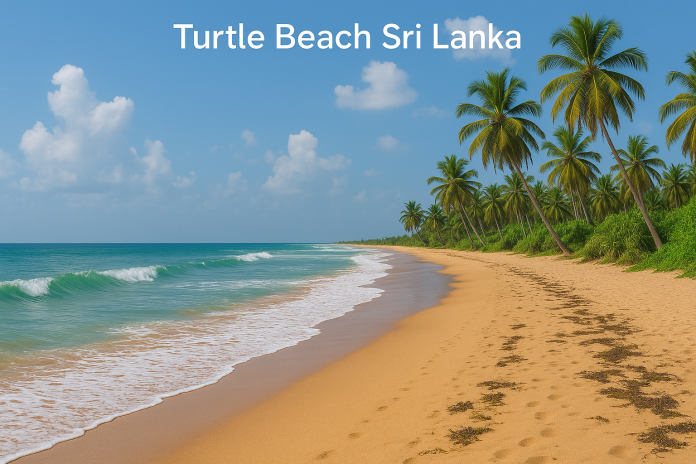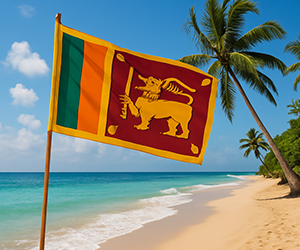Introduction to Rekawa Beach
Nestled on the southern coast of Sri Lanka near Tangalle, Rekawa Beach is a pristine stretch of coastline known for its untouched natural beauty and incredible biodiversity. Unlike the more commercialized beaches in Sri Lanka, Rekawa offers a peaceful escape where nature thrives undisturbed. This hidden gem is especially famous for its sea turtle nesting grounds, making it a significant location for eco-tourism and wildlife lovers. Whether you’re looking to relax under the palm trees, witness turtle hatchlings making their way to the ocean, or enjoy a slow-paced beach retreat, Rekawa Beach has it all.
Why Rekawa Beach is Special
What sets Rekawa Beach apart from others in Sri Lanka is its commitment to conservation and sustainable tourism. There are no large hotels or loud beach bars here. Instead, you’ll find eco-friendly lodges, serene walking paths, and a stunning natural landscape of soft golden sand bordered by swaying coconut trees. The lack of commercial development helps preserve the area’s ecological balance, making it one of the best offbeat destinations in Sri Lanka. Visitors often describe Rekawa as a place where time slows down and where nature takes center stage.
Sea Turtle Nesting at Rekawa
Rekawa is one of the most important turtle nesting sites in Sri Lanka. Every night throughout the year, but particularly from April to July, sea turtles come ashore to lay their eggs. The beach is home to five species of sea turtles: Green, Loggerhead, Olive Ridley, Hawksbill, and the mighty Leatherback. The Rekawa Turtle Conservation Project organizes nightly turtle watches where visitors can respectfully observe this awe-inspiring event under the guidance of local conservationists. Ethical tourism is strongly encouraged—no flash photography, no touching the turtles, and always following the ranger’s instructions.
How to Get to Rekawa Beach
Rekawa is located about 10 kilometers east of Tangalle and can be easily reached by:
- From Colombo: A 4.5-hour drive along the Southern Expressway.
- From Galle/Matara: Around 2 to 2.5 hours by car.
- By Train: The nearest station is Beliatta, followed by a short taxi or tuk-tuk ride.
- By Bus: Public buses run frequently to Tangalle, from where you can hire a tuk-tuk to Rekawa.
Hiring a private taxi is the most convenient option, especially if you’re traveling with family or carrying luggage.
Things to Do in and Around Rekawa
- Turtle Watching Tours: The highlight of any visit to Rekawa.
- Sunrise and Sunset Beach Walks: Quiet and meditative, perfect for photography.
- Rekawa Lagoon Boat Rides: Great for birdwatching and mangrove exploration.
- Yoga and Meditation: Many guesthouses offer wellness retreats.
- Kalametiya Bird Sanctuary: Just 30 minutes away, ideal for bird lovers.
- Explore Nearby Beaches: Tangalle Beach, Silent Beach, and Goyambokka Beach are within reach.
Where to Stay in Rekawa
Accommodation in Rekawa focuses on sustainability and simplicity:
- Turtle Paradise Eco Lodge: Close to the beach and turtle watching site.
- Rekawa Beach Resort: Budget-friendly with ocean views.
- Cabanas and Homestays: Run by locals, offering warm hospitality and homemade food.
It’s advisable to book in advance during turtle nesting season (April–July) as accommodations fill up quickly.
Where to Eat: Local Dining Options
There are a few small restaurants and beach cafes serving delicious Sri Lankan cuisine:
- Seafood curries, fresh coconut water, and rice & curry platters are the norm.
- Many guesthouses offer home-cooked meals using locally sourced ingredients.
- For snacks and drinks, Tangalle town offers more variety just a short drive away.
Best Time to Visit Rekawa Beach
- Turtle Watching: Best from April to July (nesting season).
- Beach Weather: November to April is the dry season, perfect for sunbathing and swimming.
- Avoid: May to October, when monsoon rains can limit activities.
Wildlife, Flora, and Conservation Efforts
Rekawa is rich in biodiversity beyond turtles. The nearby lagoon is home to exotic birds, amphibians, and reptiles. Mangrove ecosystems help maintain ecological balance and prevent coastal erosion. Local conservationists work tirelessly to protect turtle nests, rehabilitate injured wildlife, and educate visitors about environmental stewardship.
Rekawa Turtle Conservation Project: In Detail
Started in the mid-1990s, the Rekawa Turtle Conservation Project has become a model for community-based wildlife protection. It employs local villagers as rangers and guides, creating economic opportunities while fostering conservation awareness. Tour fees help fund protection patrols, nest monitoring, and educational programs.
Volunteering opportunities are available for those interested in conservation work. Activities include beach patrols, data collection, and community education.
Travel Tips for Visitors
- Pack light, bring eco-friendly toiletries.
- Red light flashlights are preferred for turtle watching.
- Respect local customs and dress modestly away from the beach.
- Cash only: Most places don’t accept cards.
- Stay quiet and patient during turtle watching tours.
Nearby Attractions to Explore
- Mulkirigala Rock Temple: Ancient Buddhist rock monastery just 30 minutes away.
- Hummanaya Blowhole: The second-largest in the world.
- Ridiyagama Safari Park: Home to elephants, zebras, and other exotic animals.
- Tangalle Town: A charming town with a local market, restaurants, and cultural landmarks.
Why Rekawa Beach Should Be on Your Bucket List
Rekawa is not just a destination, it’s an experience. It offers a perfect blend of adventure, tranquility, and purpose-driven travel. Whether you’re captivated by wildlife, seeking a romantic retreat, or simply craving peace and quiet, Rekawa Beach is a sanctuary that nourishes both the soul and the planet.
Conclusion
Rekawa Beach stands as a shining example of how tourism and conservation can coexist. Far from the crowds, it offers an opportunity to connect with nature in a meaningful way. By choosing Rekawa, you not only discover one of Sri Lanka’s most beautiful beaches but also support a community dedicated to protecting its natural heritage. Visit Rekawa, and leave with more than just memories—leave with purpose and peace.




